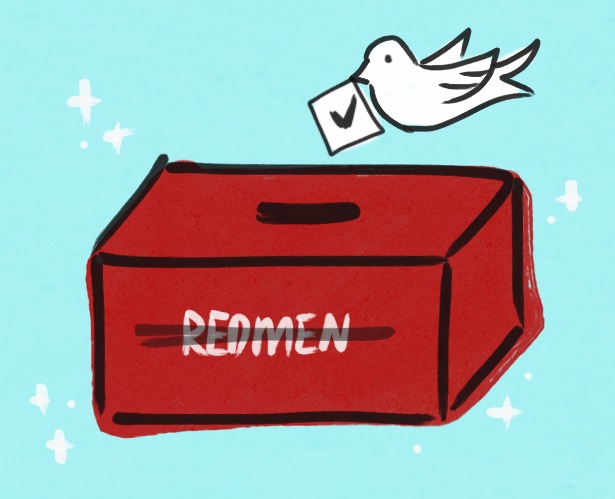In the Students’ Society of McGill University’s (SSMU) Fall 2018 referendum, 78.8 per cent of students voted in favour of changing the McGill men’s varsity athletics teams’ name. The result comes in the wake of a petition launched by SSMU Indigenous Affairs commissioner Tomas Jirousek, which has over 10,000 signatures, and a recent on-campus demonstration that garnered widespread support.
The SSMU referendum vote is the culmination of the massively-successful #ChangeTheName student movement. It is a triumph, but also the disconcerting beginning of a new chapter in the process of changing the name: That of the McGill administration’s response, over which students have little control. While the referendum result and #ChangeTheName campaign have demonstrated the widespread sentiment of the student body, the McGill administration is only beholden to this sentiment by principle. The decision to change the name ultimately rests within the hands of the administration, who will be acutely aware of the change’s potential costs.
In order to outweigh the influence of the deterrents confronting the administration, students must continue to publicly engage with this issue and remind the administration that concession to this motion is their moral imperative. Jirousek recently told the CBC that he plans on releasing a letter of support signed by more than 100 professors. This ongoing public engagement and demonstration of support will apply necessary pressure on the administration.
In an email sent to McGill students on Oct. 28, Interim Deputy Provost, Student Life and Learning Fabrice Labeau, told students that the administration would be approaching a decision in December.
“In December, we will hear from the Working Group on Principles of Commemoration and Renaming, and be able to use their findings as a source of guidance on this issue,” Labeau wrote.
It seems dubious that the group will be able to present the administration with empirical ‘findings’ that make the decision to change the name simple. This is not an empirical issue, but a moral one in which the greatest instruments of influence are students’ voices. McGill students must insist that the administration take the referendum result seriously.
However, the administration will likely be wary of alienating the support of older conservative donors, whose conception of the McGill identity includes the name as a central element. Given the relatively-minimal cost of attending McGill for in-province students, McGill is more reliant on donors than other universities to fund extra-curricular programs. Alienating donors could put a significant strain on athletic programs. The logistics involved in dismantling Redman-branded accoutrements— such as jerseys and murals—would be daunting, both financially and practically. Additionally, the nagging appeal of preserving the university’s historical identity persists.
Yet, reconciliation and acknowledgement of wrongdoing to the indigenous peoples of Canada must take precedence over the relative triviality of preserving an athletic brand. Furthermore, if the McGill administration were to disregard the sentiment of the student body—as communicated through the SSMU referendum—they would be setting a precedent deleterious to our student government’s leverage to effect change. We are now in the precarious position of relying upon the administration’s deference to principle. For change to occur, we must make this position a vocal one.









